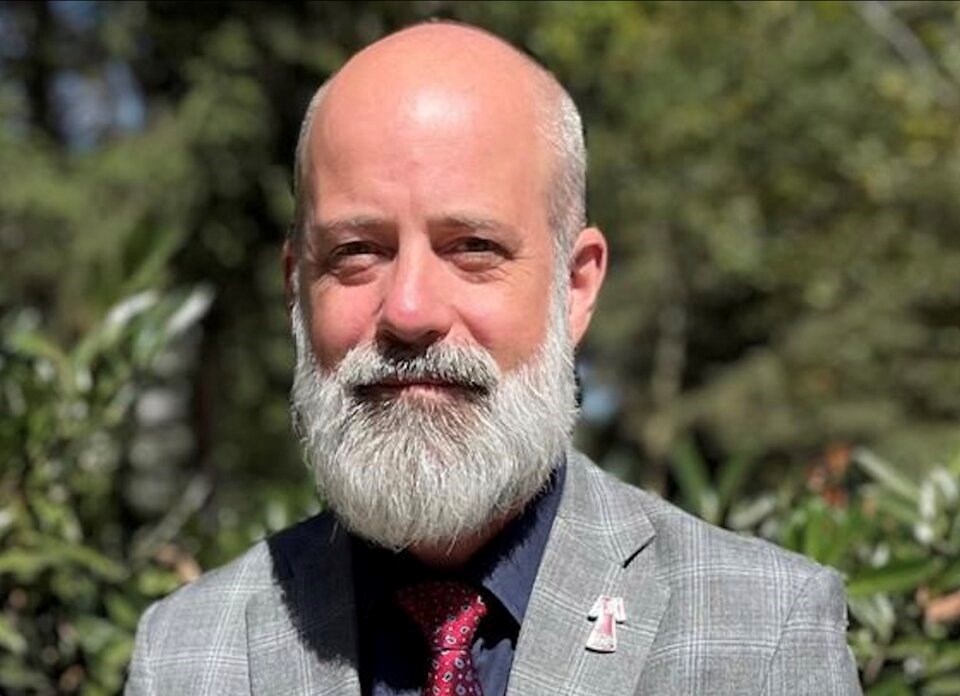Teachers from across British Columbia re-elected a former Chilliwack elementary teacher as president of their union in a landslide victory against a challenger who ran on a platform to divest the union’s $38-billion pension fund from oil and gas investments.
The vote, held Tuesday morning at a Hyatt Regency in Vancouver, sa国际传媒, came as 600 delegates representing nearly 50,000 teachers gathered for the BC Teachers' Federation's (BCTF) annual general meeting. Clint Johnston garnered more than 80 per cent of the vote in a result that solidified the incumbent as the teacher federation’s top representative.
“I feel pretty good,” said Johnston, who ran on a promise to continue bargaining to improve teacher working conditions. “I think I'm gonna keep doing the same thing.”
Johnston, 52, faced Vancouver high school teacher Jillian Maguire, a climate advocate who in the past was arrested for protesting against old-growth logging and who’s the lead guitarist in the eco-feminist punk rock band Tiny Milkshakes.
Maguire had run on a platform calling for the BC Teachers' Pension Plan to move to divest its nearly $38 billion in assets from fossil fuel companies. The high school teacher said she decided to challenge Johnston after he had failed to follow through on a 2022 motion to lobby the BC Investment Corporation (BCI) to divest the pension fund from oil and gas companies.
“He sort of sat on it and ignored it,” Maguire told Glacier Media in an interview a day before the vote.
Johnston said BCTF leadership had raised the motion with trustees of the pension fund, but that the board decided it would be better to remain invested in fossil fuel companies, both to maximize returns and to try to influence them to reduce their carbon footprint over the long-term.
“There's that fiduciary responsibility to trustees in any pension plan to meet the financial needs, to make sure they're doing the best they can to keep that pension plan tenable,” said Johnston. “And then there's the other, the moral, ethical, if you will, obligations.”
“They have to balance that.”
Johnston, who has five children and has his own pension tied up with BCI, said he’s seeking to find that same balance as he looks to influence how and where the corporation invests teachers' pensions.
“We can talk to them, work with them, and then advocate to the trustees to see if we can move towards [fossil fuel] divestment if we think that's the best way,” he said.
Following her defeat Tuesday, Maguire said she would continue to advocate for action to divest BCTF’s pension fund from fossil fuels.
“I’m going to hold Clint’s feet to the fire,” she said. “I’m shocked that a not one candidate mentioned climate in their bio. There's no mention of climate in this building.”
“I mean, this is the biggest existential crisis humanity has ever seen and it's almost like it doesn't exist.”
Maguire said she’s also hopeful a motion she proposed will move the BCTF to come up with a plan to fully divest teacher pensions from fossil fuel by 2028. Another motion put forward by the Greater Victoria school board, seeks to create a task force to investigate the ways to divest the teachers’ pension fund from fossil fuels.
Report highlights climate’s threat to pensions and planet
The vote comes a day after the Institute for Energy Economics and Financial Analysis released a report finding billions of dollars in pension assets were at risk due to climate change.
A global rise in temperature of two degrees Celsius could erase $11 billion of BCI’s managed assets, including $2 billion from the teachers' pension fund, the report found.
“The writing on the wall regarding the future of fossil fuels as an investment is clear,” stated the report.
“Many forward-looking institutional investors are gradually repricing these risks, minimizing investment, and shifting capital away from the sector.”
The BC Teachers' Pension Plan is far from the only public pension heavily invested in oil and gas.
A 2021 report found sa国际传媒’s largest pension fund — the sa国际传媒 Pension Plan — had increased investments in fossil fuels by 7.7 per cent since 2016, the same year the Canadian government signed the Paris Agreement that would later limit warming to 1.5 C below pre-industrial levels.
“One of the hugest problems we have right now is bringing forward the capital we need in the scale and scope to tackle 1.5 C temperature change,” Jessica Dempsey, a University of British Columbia researcher in the school's geography department and the report’s lead author, said at the time.
“These pension funds are invested in a devastating future.”
That devastating future is looking much more likely — on Monday, the Intergovernmental Panel on Climate Change said the world will likely blow past the 1.5 C threshold agreed upon at the 2015 Paris Accords.
That realization comes as many nations, including sa国际传媒, continue to green-light new fossil fuel projects despite warnings such actions would likely derail global targets to limit fallout from climate change.
United Nations Secretary General António Guterres said limiting global warming to 1.5 degrees Celsius would take a “take a quantum leap in climate action.”
“In short, our world needs climate action on all fronts — everything, everywhere, all at once,” he said Monday.

